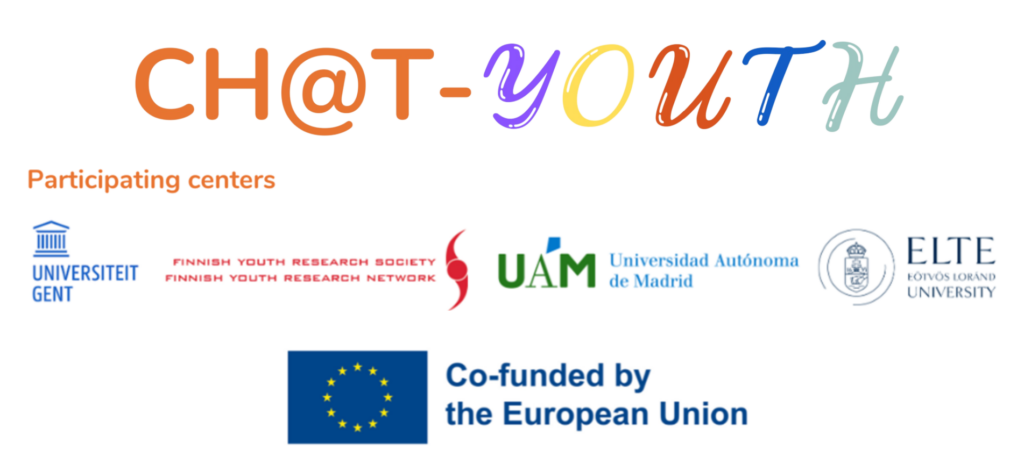
PROJECT PAGE / EVENTS / PROFESSIONAL DEVELOPMENT / RESULTS / NETWORKING
Survey about the reporting systems in chat services
At the CHAT-YOUTH project we are currently mapping the reporting systems used by Online Counseling Chat Services (OCCS) in Europe. This means that we are studying the diversity of information collection from online counselling sessions. We ask you to help us and answer this anonymous survey latest by 20th of August 2025.
Many OCCS collect data about conversations to improve their services and to gain perspectives on trends that affect service users. This is typically done by using a tool to manually collect information from the discussions with service users after the conversations. However, there is little research on the tools or reporting systems that service providers use to collect data about the service use.
If you work with a chat service, we would be very grateful if you could take the time to complete this anonymous survey about the use, scope and purpose of the reporting systems. Your valuable responses will be used anonymously for research. The aim is to improve existing reporting systems and to help establish new reporting systems that work effectively and collect quality data.
Link to survey: https://link.webropolsurveys.com/S/25446929EAFC236A
The survey will take approximately 5 minutes.
You can complete the survey in English, Dutch, Spanish, Hungarian or Finnish.
Mark your calendar for the Community of Practice meeting in 16th of September
CHAT-YOUTH project is organizing its sixts Community of Practice meeting on Tuesday 16th of September 11:00-12:30 CET via Teams. Sign up through this LINK. More information about the content of the meeting will be published soon!
Read more about the content of the past CoP’s HERE.
CHAT-YOUTH project website has new structure
This page will continue posting updates about the project, but more information about the CHAT-YOUTH project can be found though the links above! For sharing, here is a shorter web address to our new CHAT-YOUTH pages: https://nuorisotutkimus.fi/en/research/chat-youth/
A new article concerning chat-services for youth
How do young people discuss the topic of suicide in an anonymous chat counselling service?
A new article was published in January 2025. It examines young people’s genuine experiences in terms of suicidal behavior discussed online and their motivations for seeking help anonymously.
The study consisted of text-based synchronous conversations between young service users and online adult counsellors during a period of five months. For in-depth analyses, 62 conversations were selected and analyzed focusing on the described suicidal behavior and the given reasons for despair and entering the OCCS.
Alix Helfer, Kati Kataja & Tuuli Pitkänen (2025). When Despair Takes Over: Suicide Conversations in an Online Counseling Chat Service for Youth. Child & Youth Services, 1–24. https://doi.org/10.1080/0145935X.2024.2437758
Read the article here!
A Brief Report – Results from WP2
What are the strengths of online counselling chat services? What is needed to start one? How can the most common problems associated with online chat services be addressed?
Based on thorough desk reviews and interviews of the experts of the field, the CHAT-YOUTH consortium has produced a brief report on the most pressing issues of online chat counselling services for youth.
The report is available as a pdf-file here:
- Brief report in English
- Brief report in Finnish
- Brief report in Spanish
- Brief report in Dutch
- Brief report in Hungarian
- Brief report in French
Networking and Community of Practice meetings
The future CoP meetings:
- Tuesday February 11th, 2025 (11-12u30 CET)
- Tuesday June 17th, 2025 (11-12u30 CET)
- Tuesday September 16th, 2025 (11-12u30 CET).
Webinars:
- Webinar 1: 14th of January (15u – 17u CET): Artificial Intelligence
- Webinar 2: May 2025 (parallel with symposium in Ghent, Belgium)
- Stakeholder symposium: 22-23 May 2025
- Webinar 3: November/December 2025
If you wish to learn more about the CoPs or the webinars, feel free to contact Elke Denayer (elke.denayer@ugent.be) with any questions or suggestions.
Funding and partners
ERASMUS+ KA220-YOU – Cooperation partnerships in youth.
Alexis Dewaele, Lien Goossens and Elke Denayer, Universiteit Gent, Belgium
Maria Cabello Salmerón and Irati Higuera Lozano, La Universidad Autónoma de Madrid, Spain
Katalin Felvinczi, Zsuza Kaló and Mónika Rényi, Eötvös Loránd University, Hungary
Tuuli Pitkänen and Siiri Soininvaara, Finnish Youth Research Society, Finland

Link to an article at Lavanguardia.com in Spanish
- Start year:
- 2023
- End year:
- 2026
Project Director

Tuuli Pitkänen
PhD, Adjunct professor
Research Manager
+358 41 517 8678
tuuli.pitkanen@youthresearch.fi

